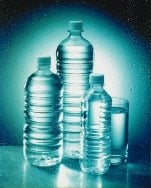Have you heard the welcome news?
Last week Johnson & Johnson reiterated it’s pledge to slowly phase out the toxic ingredients used in their baby product line by the end of 2013 and announced that it will also reformulate their adult personal care products which include Lubriderm, Aveeno and Neutrogena products, by 2015.
A large coalition of health and environmental groups, called The Campaign For Safe Cosmetics started calling for the removal of several dangerous and possibly carcinogenic chemicals from personal care products in 2009. Formaldehyde, 1,4 dioxan, triclosan, phthalates and parabens are just a few of the “chemicals of concern” according to the Environmental Working Group who is part of that coalition. Their website, www.ewg.org/skindeep contains a database of 75,000 personal care products that they have rated from 0-10 for toxicity levels.
The FDA does not test personal care products for safety - they rely on the individual companies to do that.
Personal care products fall under the “cosmetics” label, which includes deodorant, lotions, make-up, oral hygiene products and more.
Read More.png?width=305&height=132&name=NIHAlogoBLUE_3_transparent%20(2).png)


